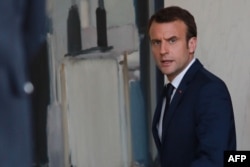French President Emmanuel Macron is heading Monday to the United States for a state visit with President Donald Trump, looking to convince him of the need to keep a U.S. presence in Syria even after the defeat of Islamic State terrorists, and to give the European Union an exemption on new aluminum and steel tariffs.
"We will have to build a new Syria after war. That's why I think the U.S. role is very important," Macron told Fox News during an interview at the Elysee Palace in Paris ahead of the trip.
He described the U.S. as "a player of last resorts for peace and multilateralism."
Trump has said he wants to pull the estimated 2,000 U.S. troops from Syria as soon as possible, even as a week ago he ordered the U.S. military to join France and Britain in launching a barrage of missiles targeting Syrian chemical weapons facilities in response to a suspected Syrian gas attack. Trump's planned troop withdrawal comes after the fall of Raqqa, IS's self-declared capital of its religious caliphate in northern Syria.
"I'm going to be very blunt," Macron said in the interview. "If we leave ... will we leave the floor to the Iranian regime and [Syrian President] Bashar al-Assad? They will prepare a new war."
He said the U.S. and France are allied but that "even Russia and Turkey will have a very important role to play to create this new Syria and ensure the Syrian people decide for the future."
Macron also said that while the Iranian nuclear deal is imperfect, he does not see a better option and wants to see it remain intact while working to put in place ways to constrain Iran's ballistic missile program.
The French leader and his wife, Brigitte, are due to join Trump and his wife, Melania, for dinner Monday night. Trump and Macron will then hold meetings Tuesday before a state dinner Tuesday night.
Macron is also scheduled to give a speech to the U.S. Congress on Wednesday.
His visit is occurring as an international chemical weapons monitoring group said its team of inspectors has collected samples at the site of the alleged gas attack two weeks ago in the Syrian town of Douma.
The Organization for the Prohibition of Chemical Weapons said a report based on the findings and other information gathered by the team will be drafted after the samples are analyzed by designated laboratories.
The group added it will "evaluate the situation and consider future steps, including another possible visit to Douma."
The fact-finding team's attempts to enter the town were initially postponed for several days due to a series of security-related setbacks.
Emergency responders said at least 40 people were killed in the suspected April 7 gas attack, which the U.S. and its allies blamed on the Assad regime.
The Syrian government has denied using chemical weapons, a violation of international law, and invited inspectors to investigate.
They arrived in Syria on April 14, the same day the U.S., Britain and France launched missiles targeting three chemical weapons facilities in Syria.
Ken Ward, the U.S. ambassador to the OPCW, claimed on April 16 the Russians had already visited the site of the chemical weapons attack and "may have tampered with it," a charge Moscow rejected.
On April 9, Moscow's U.N. ambassador told the U.N. Security Council that Russian experts had visited the site, collected soil samples, interviewed witnesses and medical personnel, and determined no chemical weapons attack had taken place.
U.S. military officials have said the airstrikes were designed to send a powerful message to Syria and its backers, showing that the United States, Britain and France could slice through the nation's air defense systems at will.







